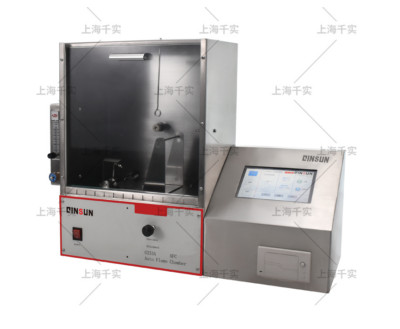What are the two burning test methods of the 45 Degree Flammability Tester?

The 45 Degree Flammability Tester is a common instrument for testing the flammability of fabrics. It is used to test the flammability of pyjamas or decorative fabrics, with a sealed stainless steel chamber, observation window and standard burner for accurate testing of flame spread, and is suitable for laboratory determination of the flammability of plastic and non-metallic specimens in horizontal or vertical directions.
For the 500W flame test, according to UL94, it is divided into the flammability test for strip specimens and the flammability test for plate specimens.
1. Strip specimen flammability test vertical specimens
The size of the specimen (125mm±5mm) x (13mm_-4-0.5ram) x thickness (usually the smaller thickness required, the thicker cannot exceed t3mm).

The ring specimen holder was clamped to the specimen at 6mm, a cotton pad with an area of 50mm x 50mm was placed horizontally under the specimen, the distance between the lower end of the specimen and the cotton pad was 300mm ± 10mm, the angle between the axis of this Bunsen burner lamp and the vertical direction was 20±5° degrees, and a flame burning was applied to the specimen five times at 5s ± 0.1s each time and at 5s ± 0.1s intervals. According to the regulations according to GB/T, if during the course of the test the strip test sample has drips, curls and elongation, the position of the torch should be adjusted so that the conical term of the blue conical flame centre just touches the remaining part of the sample, which requires the Bunsen burner to be able to be moved in the vertical plane during the experiment without affecting the internal environment of the test chamber. The torch should be removed immediately after each application of flame so as not to interfere with the continued ignition of the specimen.
2. Plate row specimens
The size of the specimen is (150mm±5mm) x (150mm±5ram) x thickness (usually the smaller thickness required, the thicker not to exceed 13mm).
The sample is held horizontally in a ring-shaped specimen holder with the torch at an angle of 20±5° to the vertical surface so that the conical top of the blue flame centre just touches the centre of the bottom surface of the plate sample, and the flame is applied to the sample five times for 5±0.5s each time with an interval of 5s±0.5s. The torch should be removed immediately after each application of the flame so as not to affect the renewal of the sample. The sample is graded according to the time of burning.
2023-02-01 11:18

